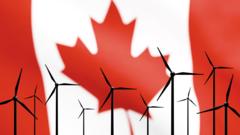In the lead-up to the upcoming federal election, Canada's political landscape is witnessing a notable shift as candidates pivot away from discussions about climate change. With the focus on the aggressive political maneuvers ultimately driven by U.S. politics, particularly the assertiveness of President Donald Trump, the urgency of climate policy appears to be diminishing.
Mark Carney, the leader of the ruling Liberals and prime minister, is promoting a vision of Canada becoming a leader in both conventional and renewable energy. Meanwhile, the Conservatives, led by Pierre Poilievre, are advocating for a resurgence of the oil and gas sector, including proposals to eliminate the existing carbon tax which has gained unfavorable public perception amidst rising living costs.
Carney's removal of the consumer carbon tax, which was initially introduced in 2019, represents a remarkable shift as it had been a cornerstone of his party’s climate policy. Critics argue that this move signals an acceptance of the narrative that climate policies impose economic burdens, essentially granting leverage to his opposition.
Additionally, with the backdrop of high inflation and fluctuating housing and energy prices, public interest in climate issues has significantly waned. The war in Ukraine has illuminated the value of Canada's vast natural resources, drawing international attention to the country's energy potential rather than its environmental commitments.
Polls indicate that many voters are now preoccupied with immediate fiscal concerns, while the war has prompted a reconsideration of resource policies. As both candidates vie for public favor, Poilievre's campaign focuses on cost-of-living issues and law enforcement, reflecting the current political climate that favors energy industry growth.
In the tumultuous political environment, the substantial relationship between Canada and the U.S. remains a central theme. With Canada being a significant oil supplier to its southern neighbor, the implications of U.S. energy policies on Canadian jobs and the economy are increasingly pertinent.
Carney and Poilievre have made the creation of energy corridors a campaign promise, aiming to facilitate oil and gas transportation while navigating environmental concerns. Yet, this trajectory faces criticism from climate advocates, who warn of the risks associated with expanding fossil fuel dependence.
As Canada pledged to adhere to international carbon reduction targets, current political strategies may clash with these commitments, complicating the nation’s climate objectives. Leaders from other parties view Carney and Poilievre’s policies as a blatant disregard for climate realities.
As the election day approaches, Canadians will be faced with the challenge of choosing a path forward—one that balances the country's energy demands with urgent climate responsibilities.
Mark Carney, the leader of the ruling Liberals and prime minister, is promoting a vision of Canada becoming a leader in both conventional and renewable energy. Meanwhile, the Conservatives, led by Pierre Poilievre, are advocating for a resurgence of the oil and gas sector, including proposals to eliminate the existing carbon tax which has gained unfavorable public perception amidst rising living costs.
Carney's removal of the consumer carbon tax, which was initially introduced in 2019, represents a remarkable shift as it had been a cornerstone of his party’s climate policy. Critics argue that this move signals an acceptance of the narrative that climate policies impose economic burdens, essentially granting leverage to his opposition.
Additionally, with the backdrop of high inflation and fluctuating housing and energy prices, public interest in climate issues has significantly waned. The war in Ukraine has illuminated the value of Canada's vast natural resources, drawing international attention to the country's energy potential rather than its environmental commitments.
Polls indicate that many voters are now preoccupied with immediate fiscal concerns, while the war has prompted a reconsideration of resource policies. As both candidates vie for public favor, Poilievre's campaign focuses on cost-of-living issues and law enforcement, reflecting the current political climate that favors energy industry growth.
In the tumultuous political environment, the substantial relationship between Canada and the U.S. remains a central theme. With Canada being a significant oil supplier to its southern neighbor, the implications of U.S. energy policies on Canadian jobs and the economy are increasingly pertinent.
Carney and Poilievre have made the creation of energy corridors a campaign promise, aiming to facilitate oil and gas transportation while navigating environmental concerns. Yet, this trajectory faces criticism from climate advocates, who warn of the risks associated with expanding fossil fuel dependence.
As Canada pledged to adhere to international carbon reduction targets, current political strategies may clash with these commitments, complicating the nation’s climate objectives. Leaders from other parties view Carney and Poilievre’s policies as a blatant disregard for climate realities.
As the election day approaches, Canadians will be faced with the challenge of choosing a path forward—one that balances the country's energy demands with urgent climate responsibilities.



















